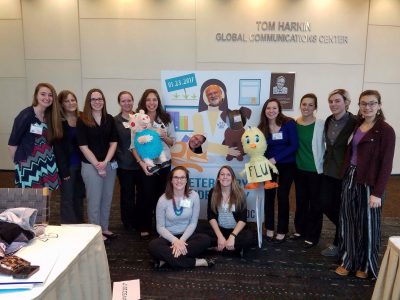by second-year DVM student Kaela Navarro
With a registration time of 7:30 a.m. on January 22, the day started bright and early at the Centers for Disease Control (CDC) in Atlanta, GA for the bi-annual Veterinary Student Day conference. Our group of 11 first-and-second-year students had been accepted to attend the conference after applying in the fall of 2016. This conference was going to be somewhat of a new experience for me; I initially entered veterinary school with only a career in lab animal medicine in mind. However, my previous interests in community health in underrepresented communities were reignited after taking classes in both public health and epidemiology during my third semester, and from recent events, such as the Flint water crisis. The Veterinary Student Day conference advertised a day’s worth of speakers that were CDC public health researchers and veterinarians in various public health fields. It seemed to be the perfect opportunity to explore what kinds of careers veterinarians held in different public health fields.
So, into the CDC we filed, joining several hundred veterinary students and faculty members from all over the country for our morning session, “Epidemiology in Action.” Researchers from the CDC covered different ongoing veterinary public health projects, such as the response to the Ebola virus in the United States, the prevention of Rocky Mountain spotted fever, and a myriad of other topics ranging from Global Rabies Control to MERS in camels. One of the morning speakers who especially caught my attention was Dr. Nina Marano. Although Dr. Marano started out as veterinarian, she is currently the Chief of the Immigrant, Refugee, and Migrant Health branch at the CDC. I know veterinarians are all-around awesome, but it was still amazing to hear how our training in animal health could lead someone into a seemingly totally different field.

In between sessions, I had the chance to explore the exhibit hall, where different programs advertised their residencies, jobs, and master of public health degrees. Some of the programs were better known, such as the American Association of Food Safety and Public Health Veterinarians and the US Public Health Service Commissioned Corps. There also were many interests represented in public health that I had not considered, such as the informatics and health system integration training programs and the Epidemiology Intelligence Surveillance program. And, advertised in the middle of the exhibitors, was the lab animal medicine residency at the CDC.
Later in the afternoon, several veterinarians representing the CDC, USDA Food Safety Inspection Services and Animal and Plant Health Inspection Service, and the Food and Drug Administration sat for an “Experts Panel.” During the panel, they shared their thoughts about the importance of veterinarians in public health, and fielded questions about their career paths. One of the most common questions was, “Should I go directly into a public health career after graduation, or should I do clinical practice beforehand?”
I think many of us have asked this question in some fashion or another. “Is veterinary medicine the right career for me? Should I apply directly to vet school after undergrad, or should I work and save up some money? Will working for a few years make me look like a stronger applicant for vet school?”
While I have always admired people who have felt a calling to their careers, it is my experience that these paths almost never have a straight trajectory. As an undergraduate, I was convinced I was going to be a professor teaching chemistry. I never thought I would end up in veterinary medicine! This seemed to be the overall consensus from the expert panel. One panelist had been a lawyer before becoming a veterinarian. Whether the experts had experience in clinical practice or immediately started a career in public health after graduation, few had directly followed the initial career plans they had when they started veterinary school. However, being open to new career opportunities had expanded their career horizons and veterinary passions.
Even now, I wonder, “What will happen to me after I graduate?” So, what is the right decision to take for your career? None of us wants to feel like we missed out on opportunities, or find out your heart really was into swine medicine, not private practice. But this was one of the messages I came away with from our conference: you don’t have to be “stuck” in what practice you go into directly after graduation. Veterinary medicine is a versatile career that can take you to places you may have never considered before.
